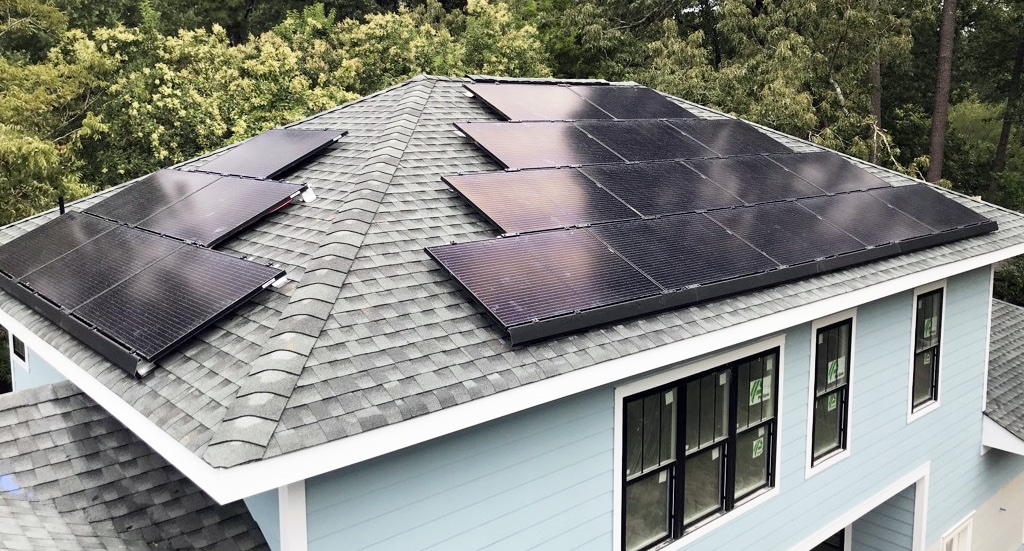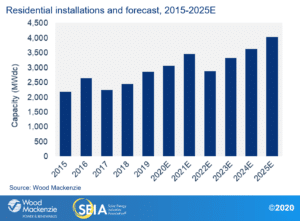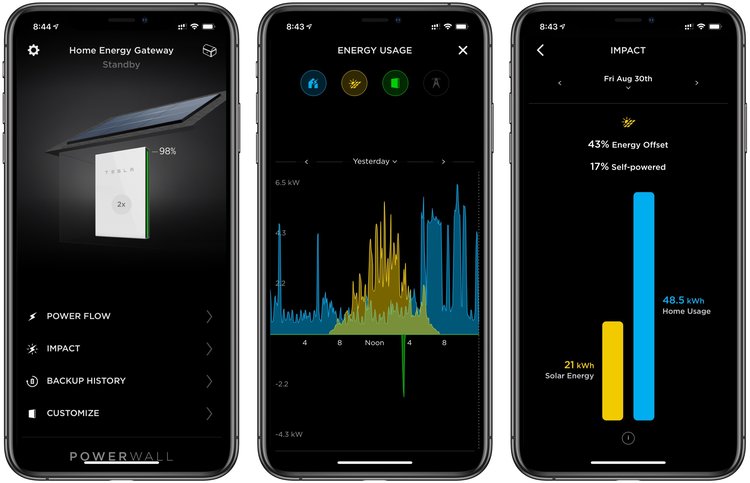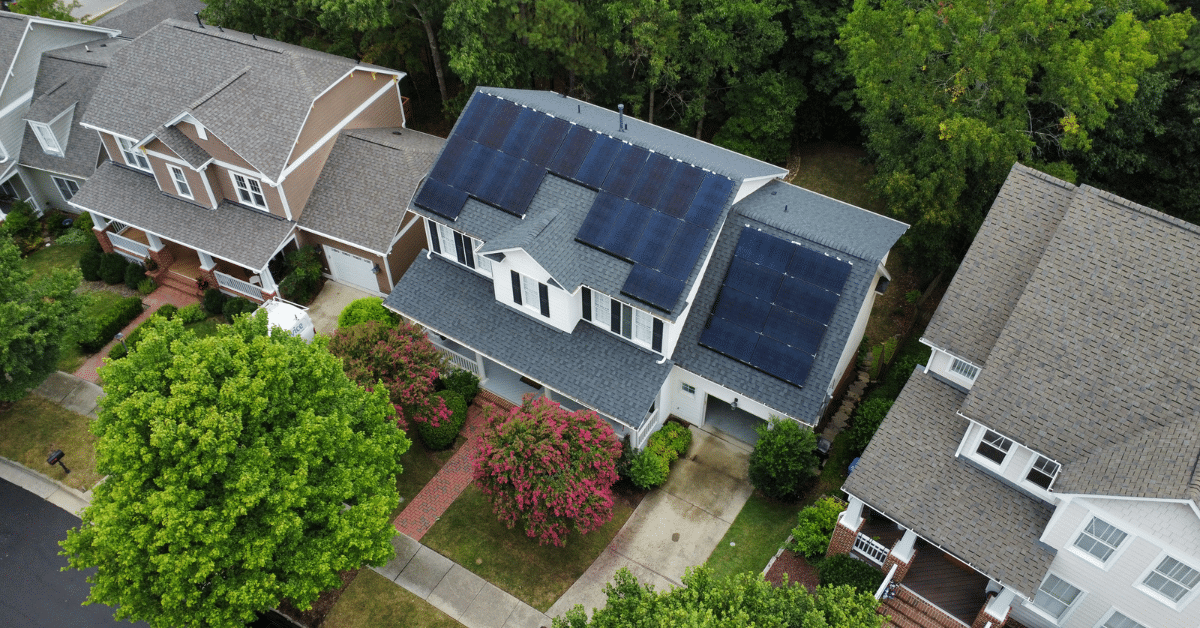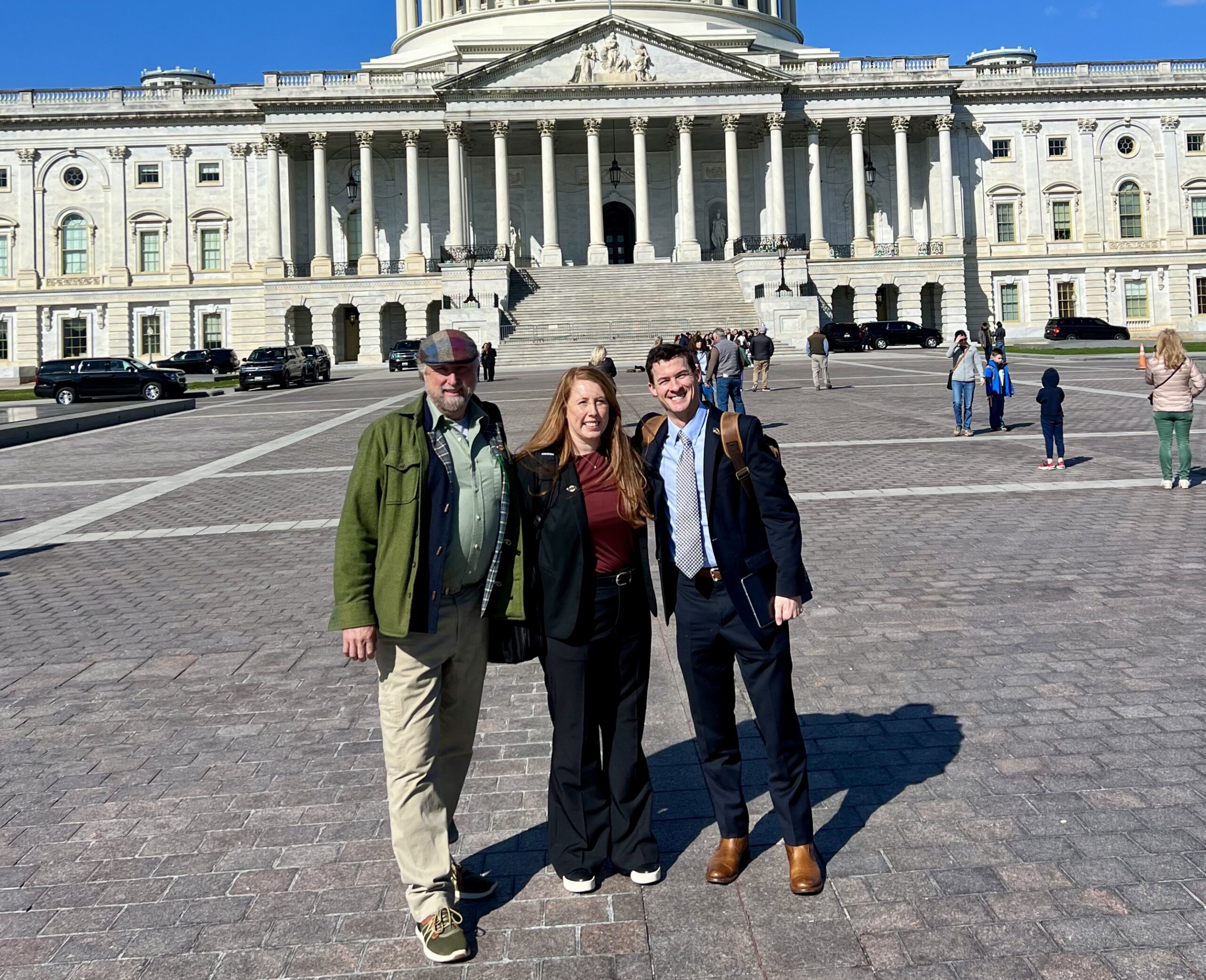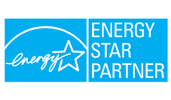- Alyssa Hardbower
- February 3, 2021
- 10 Minute Read
Topics in This Article
North Carolina Solar Demand is Growing!
The demand for solar in North Carolina is strong! Our local solar market is continuing to grow, with North Carolina still leading the list of Top Solar Power States in 2020 at number two. In 2020, around 5,500 Duke Energy customers installed solar. This brings the total number of Duke’s customers with solar up to 18,000 — triple what it was in 2017. We’ve seen this growth firsthand with the number of homeowners who joined our solar tribe last year!
National Solar Demand
Zooming out our solar lens, according to SEIA’s recent report, solar power accounted for 43% of all new electricity generating capacity added in the U.S. in 2020. Across the nation, over 10,000 solar companies are providing 250,000 clean energy jobs. We are proud to be one of them! The growth in solar at home in North Carolina, and across the country is a great sign for a cleaner, more renewable future.
North Carolina’s Solar Landscape
Solar in North Carolina fits into two primary buckets — utility scale solar (or solar farms) and solar for homes/businesses. Here’s what’s on the solar horizon in North Carolina.
Utility Scale Solar
These systems connect directly to the grid and the utility buys the electricity. These systems are less expensive due to the style and size of their construction, even though they often pay a lease for the land they are on. Typically, these systems are financed and owned by large tax paying entities — think banks and insurance companies. After a few years, they are sold to someone who wants to own the solar system for a longer period of time.
In North Carolina, Duke Energy is the largest owner of utility scale solar. In 2021 and 2022, Duke is slated to complete solar projects totaling several hundred megawatts (MW) across the Carolinas. For reference, our average home solar system size is 8.7 kilowatts (kw). Beyond the projects Duke already has in their long queue, we don’t foresee a lot of new utility scale capacity opening up.
Solar for Homes, Businesses, & Nonprofits
The second NC solar bucket includes customers that install solar at their home or business and enters a net metering agreement with their utility. The power they generate reduces the amount of power they buy from the utility. Different utilities have different criteria for the size of a solar system that you can install and how you are compensated for the power you generate.
We’ll take a deeper dive into the outlook of solar for homes, business, and nonprofits in North Carolina below!
The Future of Solar Prices & Incentives in North Carolina
If you’re thinking about holding off on your solar project to see if the cost of labor and materials will drop, you might want to refer back to the old saying, “The best time to plant a tree was 5 years ago”.
Right now, we don’t anticipate solar prices in North Carolina to drop more than the cost of electricity going up. The current incentives and solar climate in North Carolina make 2021 a great time to invest in the sun. Here are the incentives available and key details to know before banking on them.
Federal Solar Investment Tax Credit
Santa came through at the end of 2020, delivering some much needed good news! The Federal Investment Tax Credit (ITC) for solar was previously slated to drop from 26% to 22% in 2021, then disappear entirely for homes going solar after 2022.
As we make way for 2021, we can look forward to the sunny extension of the 26% Federal ITC that was passed as part of the final Coronavirus Relief Act at the end of the year. This means that homes and businesses going solar will continue to benefit from 26% tax credit savings on systems installed through 2022. Learn more about current solar incentives in North Carolina here.
With the new administration taking office, we will be putting our time and resources into supporting clean energy policy locally with the North Carolina Sustainable Energy Association (NCSEA) and nationally with Amicus Solar Cooperative.
Duke Energy Solar Rebate
The Duke Energy NC Solar Rebate was established by House Bill 589 in 2017 and will continue through 2022. This first-come, first-served rebate is not guaranteed, and is awarded based on the timestamp of when online application submissions are received when the rebate period opens each year.
Beginning in 2021, the Duke Energy NC Solar Rebate will have two application periods, cutting the application capacity in half between January and July. This is a new component to the rebate that was adopted near the end of 2020. The first application period opened at 9am on January 6th, 2021 and was even more competitive than years past, essentially filling in seconds. Both the residential and commercial portions of the January solar rebate are full, with hundreds on the waitlist. Currently, there is still room for nonprofits to apply.
We anticipate the next Duke Solar Rebate period will have similar results when the application opens again on July 7th, 2021. Because the Duke Solar Rebate has become so competitive, there is a new lottery system for the July 2021 solar rebate for residential and commercial applicants.
The rebate application period for homes and businesses will last from July 7th to July 14th. Once applications are received, they will be entered into a lottery pool. Applicants will be randomly selected to receive the rebate until the 2021 capacity limit is reached. All other applicants will be waitlisted. Nonprofits will continue to apply for the rebate through the original first come, first served system.

Since the rebate is highly competitive and not guaranteed, we are choosing not to include the rebate in our solar savings analysis for homes and businesses. We are happy to educate and consult on the impact of the rebate and how to apply if you’re interested. Regardless, now is still a great time to go solar in North Carolina, especially with the extension of the 26% Federal Investment Tax Credit for solar!
Solar Companies & Installers in NC
We’ve been a North Carolina solar installer since 2001 and have seen the many ups and downs of the NC “solar-coaster”. When it comes to small, local North Carolina solar installers, we’re in good company. As we enter 2021, it’s even more important to spend some time getting to know who you’re doing business with and what their company stands for.Take a look at our 2019 Sustainability, Impact, & Transparency report to learn more about us! Stay tuned for our 2020 report, coming out soon.
National Solar Companies in North Carolina
We are still seeing an influx of new national solar companies setting up shop in North Carolina to take advantage of the local solar incentives available in our state. We are saddened to see many of these companies continue to demonstrate shady practices, with class action lawsuits gaining national attention. In 2021, we’re putting even more effort into educating homeowners about solar so they can make informed decisions. If you are in the market for solar, take a look at our solar proposal comparison tool.
Unfortunately, some of these national solar companies have already packed up and left, leaving a trail of solar systems facing technical issues behind. In response, we are growing our tech support department to help service solar systems installed by companies that have left their NC solar customers in the dust.
Battery Storage Technology in NC
According to Audubon’s recent report, North Carolina is well positioned for battery storage growth. The report highlights that costs for Lithium Ion Batteries are declining, while demand is rapidly rising. We can vouch for the growing popularity of solar + battery storage in North Carolina, and anticipate a steady increase in demand for home use.
Expanding Our Battery Storage Options
As for what we’ll be offering in 2021, we are expanding our line of battery storage options with the Generac PWRcell. The Generac brand has a long legacy with great quality. This solution will be more geared for homeowners that are focused on daily usage of their solar as it is a slightly more efficient design than the Powerwall system. Generac also has a roadmap for the ability to connect with a generator. Learn more a bout the PWRcell in our guide.
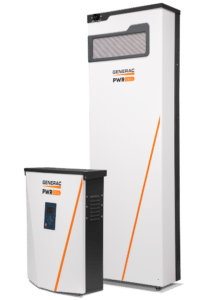
Your Guide to Generac PWRcell
Tesla Solar & Tesla Powerwall
This year we sold over 150 Tesla Powerwalls, and installed our first Tesla solar panel system (not to be confused with the solar shingle roof). Right now, there are no expectations that Tesla will be changing their Powerwall product in the coming years. Check out our Tesla Solar in North Carolina post for a full update.
Tesla Powerwall Energy Study
To better understand the potential impact of widespread battery storage adoption in North Carolina, we are working with Advanced Energy to conduct a peak energy reduction study. The study focuses on the impact of adding battery storage to Duke Energy Residential New Construction homes that have been built since 2018. The study is currently closed to new participants, but we are excited to share the results when they are ready!
Solar for Businesses, Multifamily/ Commercial Projects, & Nonprofits in NC
As with residential solar, there are some great solar incentives available for businesses and nonprofits in North Carolina.
Solar for Businesses in North Carolina
Here are a few key deadlines to keep in mind if 2021 is your solar year:
REAP Grant
- Projects over $80k need to be signed by February 15, 2021
- Projects less than $80K need to be signed by September 22, 2021
26% Federal Investment Tax Credit
Because of the recent Federal ITC extension, commercial solar projects will have until the end of 2022 to claim the 26% Tax Credit. Although it may seem like we’ve got some time to get your project going, it’s best to get the process started now so we can get all the necessary approvals in order.
Solar for Multifamily & Commercial Projects in North Carolina
If you’re a new construction commercial project looking to go solar, good news! Your project may be eligible for additional incentives. We’ve got a great team ready to help you figure out if solar is a good fit for your project, and what you might qualify for. Our multifamily and commercial energy services team is happy to check out your project to see if there are additional areas for efficiency improvements and cost savings which make solar an even better investment. Let us know about your project and we’ll figure out the rest!
Solar for Nonprofits in North Carolina
Nonprofits have a great incentive opportunity when going solar in North Carolina with the Duke Energy Solar Rebate. Although this rebate has been very competitive for homes and businesses, there is still plenty of space left for nonprofits who want to go solar! This is a unique opportunity for nonprofits in Duke Energy territory to save on their solar install since nonprofits do not qualify for other tax based incentives like the Federal Investment Tax Credit.
NC Community Solar Programs
We’re seeing community solar programs on the rise in North Carolina! We’ve worked with several builders and developers to help implement community-wide solar programs in new neighborhoods. In these communities, solar is offered as a standard option as part of the home’s buying process and can be installed during the home’s construction, before the family moves in.
Home Performance and Total Cost of Ownership
Trends continue to show that COVID has shifted homeowners needs and wants. As homeowners look to create a more live, work, and play friendly environment, home health, efficiency, and self sufficiency are even more important. A big advantage of community solar programs and purchasing a system before move in is that homeowners are often able to wrap the cost of going solar into their home mortgage, securing a much lower interest rate on their system than if they were to finance it later. Many of these new homes are also built to higher efficiency standards, making solar an even better investment.
Here are a few communities with many solar friendly builders — reach out if you want the full list:
Chatham Park, Collins Ridge, Handsmill on Lake Wylie, Fiori Hill, Cresswind at Mint Hill, Briar Chapel, Wendell Falls
Town of Apex Solar
We have consulted with several builders to help roll out their Zero Energy Blueprint program to meet the Town of Apex’s requirements for solar. If you’re building in Apex, let us know and we can help you meet those requirements!
Want to learn more?
Our solar educators would love to chat about solar with you! Reach out and let us know about your solar goals.
Free Solar Power 101 Guide
Ready to Get Started?
Schedule a free assessment to learn more about solar power & battery storage for your home.
About Us
North Carolina’s solar power and building performance expert. Founded in 2001, we’ve worked for 20+ years to improve the way people make and use energy.

